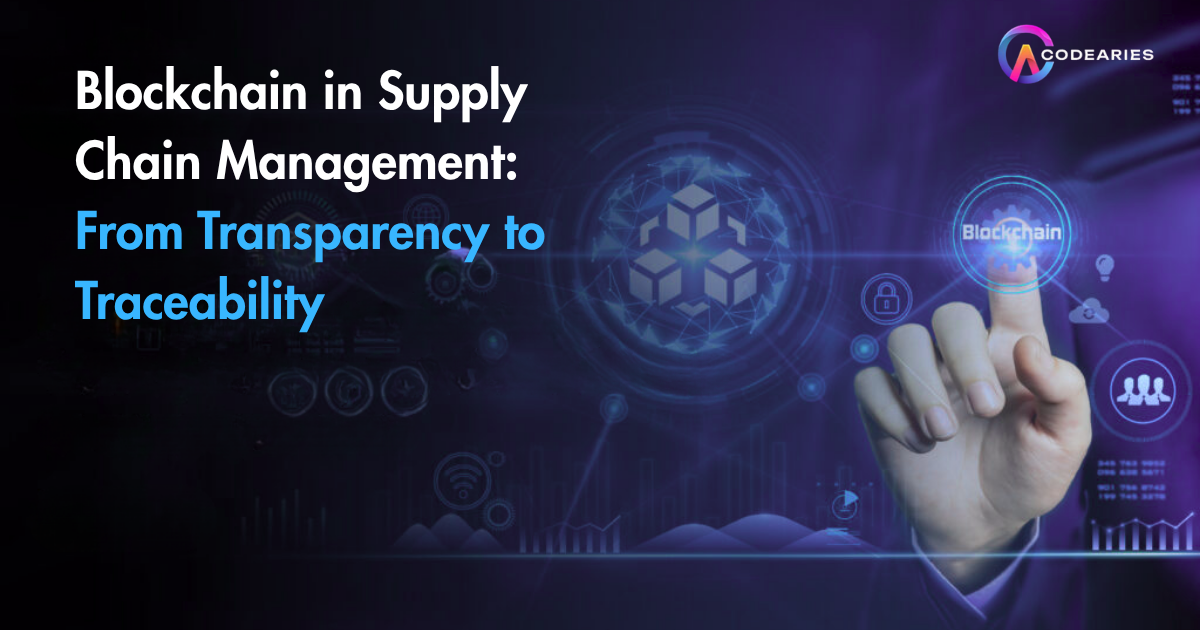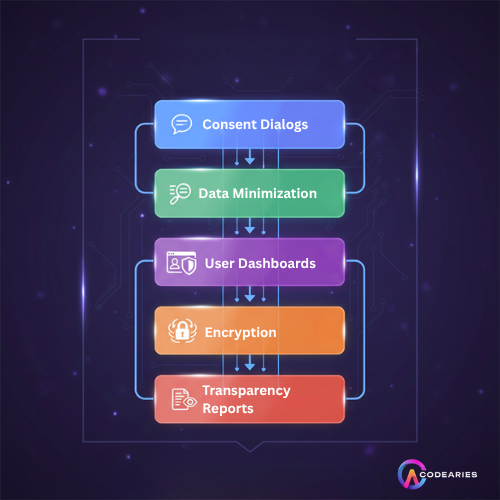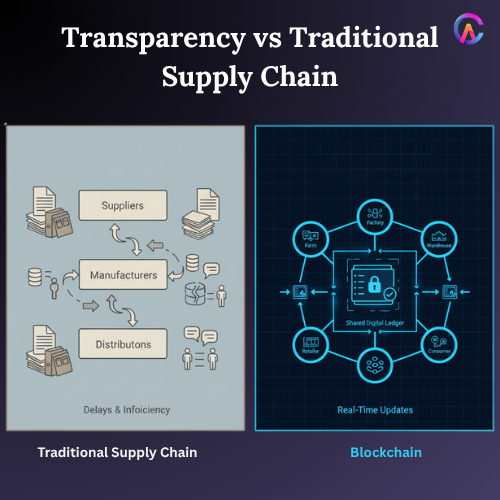
In today’s global and interconnected world, supply chain management faces challenges like lack of transparency, poor traceability, fraud, and inefficiency. Traditional supply chain systems often rely on separate databases, excessive paperwork, and multiple intermediaries. This creates high costs, slowdowns, and risks. Blockchain technology is changing how organizations build trust, clarity, and verification in the flow of goods and information from origin to consumer.
In this exploration, we’ll look at how blockchain drives transparency and traceability in supply chains. We will also discuss the technologies and business impacts involved and how Codearies can help companies implement next-generation solutions. At the end, you’ll find key FAQs that address real-world business concerns.
Understanding Blockchain’s Role in Supply Chain Management
What is Blockchain?
Blockchain is a distributed ledger technology (DLT) that records transactions securely, in a way that is tamper-proof and unchangeable, across a network of computers. Every transaction is time-stamped, visible to authorized participants, and traceable throughout an asset’s lifecycle.
Why Traditional Supply Chains Need Transparency and Traceability
Typical supply chains involve many stakeholders like suppliers, manufacturers, transporters, distributors, retailers, and regulators, each maintaining their own records. This fragmentation leads to:
- Low visibility across product journeys
- Increased risk of errors and counterfeits
- Disputes over provenance and compliance
- Poor response to disruptions and recalls
Blockchain addresses these issues by providing a shared truth that allows all participants, regardless of trust level, to verify records in real-time.

Key Benefits: Transparency & Traceability
1. End-to-End Tracking
Blockchain logs every transaction, shipment, and transformation of a product or component:
- Where did a product originate?
- Which suppliers, carriers, and warehouses handled it?
- Was it kept within regulatory parameters (e.g., temperature, humidity)?
- When and where were changes or delays introduced?
Anyone in the network can answer these questions immediately, improving recalls, audits, and consumer trust.
2. Fraud Prevention & Authenticity
Each entry on a blockchain is cryptographically sealed. This immutability:
- Prevents record tampering or retroactive fraud
- Makes counterfeiting vastly more difficult
- Offers proof of authenticity for luxury goods, pharmaceuticals, and more
If an entry is altered, all parties can see the attempt, which is different from traditional databases.
3. Process Automation & Efficiency
Smart contracts—codes that execute automatically when conditions are met—can automate:
- Payments (e.g., auto-release funds when goods reach a port)
- Compliance checks (instantly verifying certifications or handling)
- Paperwork reduction, ensuring all stakeholders sign off digitally
This cuts down disputes, speeds up settlement, and lowers operational costs.
4. Enhanced Collaboration
With a single source of truth, all participants—regardless of their IT systems or location—can work with synchronized records. This promotes better coordination, optimized logistics, and transparent inventory management.
5. Regulatory Compliance
Blockchain provides shareable, auditable logs. This makes it easier to meet government mandates and international standards. Real-time reporting is achievable with minimal effort, whether for financial auditing or sustainability and sourcing requirements.
Core Supply Chain Use Cases
- Food Safety: Track produce “from farm to fork” to identify contamination sources within minutes, not days.
- Pharmaceuticals: Ensure drugs are stored and transported properly; fight counterfeits.
- Luxury Goods: Authenticate origin and prevent diversion or fakes.
- Electronics: Trace raw materials, proving ethical sourcing and compliance.
- Sustainable Sourcing: Certify carbon footprints, labor practices, and regulatory adherence.
Implementation Challenges
While blockchain provides significant benefits, there are hurdles:
- Stakeholder alignment and willingness to adopt new systems
- Integration with existing IT and ERP platforms
- Public vs. private blockchain trade-offs (privacy, speed, cost)
- Onboarding suppliers and training users at every chain link
A successful deployment requires both technical skills and change management expertise

How Codearies Elevates Your Supply Chain With Blockchain
At Codearies, we work with manufacturers, retailers, logistics providers, and regulators to build strong blockchain-powered supply chain solutions tailored to each client’s needs.
Our End-to-End Expertise
- Blockchain Roadmapping & Strategy: Assessment of your supply chain and business case for blockchain change.
- Platform Development: Designing and launching secure, scalable blockchain solutions—public, private, or hybrid.
- Smart Contract Engineering: Automating transactional processes, compliance, and payments.
- Integration Services: Seamless connection to your existing ERP, WMS, CRM, and IoT systems.
- Onboarding & Change Management: Full-cycle stakeholder training and user adoption for easy implementation.
- Audit & Analytics Dashboards: Real-time visibility and reporting tailored to compliance, ESG, and operational needs.
- Security & Privacy: Strict protocols for encryption, access control, and data confidentiality.
Let Codearies power your future with supply chain systems that are transparent, resilient, and optimized for tomorrow’s needs.
Frequently Asked Questions (FAQ)
Can blockchain work alongside our existing supply chain software?
Yes, Codearies specializes in smooth blockchain integrations with popular ERP, WMS, and logistics software, ensuring minimal workflow disruption.
Is blockchain suitable for small and mid-sized enterprises?
Absolutely. Modular, cloud-based solutions make blockchain accessible and affordable for businesses of all sizes and industries.
How do you ensure sensitive data is protected on a blockchain?
We use private or permissioned blockchains, advanced encryption, and data hashing to keep confidentiality secure while maintaining transparency for relevant partners.
What proof can blockchain provide for end consumers?
Consumers can scan product QR codes to instantly check the origin, journey, certifications, and handling conditions—building brand trust.
What is the starting timeline for implementing a blockchain supply chain solution with Codearies?
Most pilot projects take 3 to 6 months from initial consultation to full deployment, with support for scaling as your needs grow.


